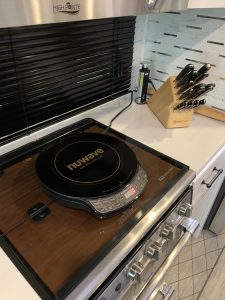Hello RV Friends,
Today I’ll be introducing you to my kitchen workhorse. Meet NuWave. She is an induction cooktop. For those of you RV’ing in a newer all electric SuperC or Class A, you may already be familiar with induction cook tops.
 Using an induction cooktop in an RV instead of propane offers several advantages:
Using an induction cooktop in an RV instead of propane offers several advantages:
- Efficiency: Induction cooktops are significantly more efficient than propane stoves. They heat the cookware directly using electromagnetic technology. They use less heat and energy compared to propane. This efficiency leads to lower costs and longer-lasting propane reserves to use for your hot water heater and/or furnace. Induction is an economical choice for RVers looking to save on propane expenses.
- Safety: Induction cooktops are safer to use in RVs compared to propane stoves. Since they don’t produce an open flame, there’s a reduced risk of fire hazards, gas leaks or carbon monoxide poisoning. This is especially important in the confined space of an RV, where safety is paramount. Additionally, induction cooktops only generate heat when the cookware is placed on the surface, so there’s a lower risk of accidental burns or overheating.
- Convenience: Induction cooktops offer greater convenience and control over cooking temperatures compared to propane stoves. Induction cooktops heat up quickly and provide precise temperature adjustments, allowing for more accurate cooking results. Induction cooktops also have flat, easy-to-clean surface, making them ideal for small living spaces like RVs. Plus, they can be used outdoors which makes cooking easier if you are also using a grill and/or griddle at the same time.
There are a couple of things you need to know before using one of these babies. First, it takes special cookware. So your favorite cast iron skillet or current pots and pans may not work. I recommend when you go to an induction cooktop, invest in a stackable stainless-steel pot and pan set (rated for induction cooking) which will save you storage space. Second, you need to watch your power consumption, so you don’t overload a circuit and trip a breaker.

